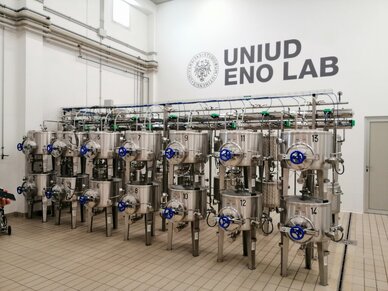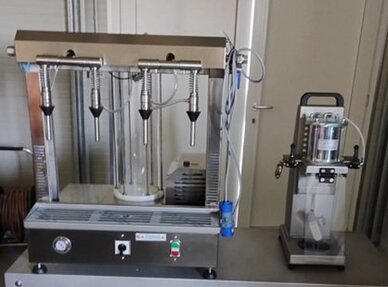



UNIUD ENO LAB
Micro-vinification cellar
Named “Uniud Eno Lab”, it supports viticultural-enological research and the teaching activities of the degree courses in Viticulture and Enology and the master’s degree in Viticulture, Enology and Wine Markets. The 300 square meter structure is made up of four parts:
the delivery area,
the microvinification cellar,
the underground barrel cellar,
the laboratory.
The aim of the cellar is to strengthen the current lines of research in viticulture, oenology, genetic improvement and oenological microbiology. Furthermore, the research activities are often carried out in collaboration with public entities and companies, thus allowing the opening of new areas of investigation. Experiments in these fields have resulted in approximately 100 microvinification tests per year, in the three-year period 2021-2023.The availability of an innovative support structure for experimental activities in viticulture and oenology amplifies the scientific strength of the University in the agri-food sector. It also strengthens teaching and orientation activities by providing students and teachers with a structure suitable for carrying out exercises, practical activities and degree theses, and also for work-based learning programs, educational visits and internships. In addition, the winery is an ideal meeting place for wine companies and service providers, to implement and manage innovative micro-vinification activities.
THE WINERY
The covered delivery area
This external area consists of 35 m2 and two closed warehouses, for a total surface area of 40 m2. The main pre-fermentative operations, namely reception and unloading of the grapes, crushing and pressing, are carried out in the delivery area. One of the two warehouses isused for the storage of equipment, such as presses, crushers and filters; the other one is dedicated to the storage of materials and small containers, such as stainless steel drums, caps, bottles and other glass containers.
The cellar
The microvinification cellar is equipped with 28 stainless steel tanks, each with a capacity of 100 liters, arranged in two overlapping rows. All tanks are temperature-controlled, featuring both cooling and heating systems that are managed automatically via PC and can also be operated remotely. An inert gas circuit is integrated to minimize oxidative processes.
Two cold storage rooms have been constructed: one for stabilization processes (ranging from 0 to 5 °C), and another for fermenting small-volume containers (ranging from 1 to 50 liters), with temperature control between 10 and 25 °C. The latter is also equipped with a carbon dioxide extraction system to manage fermentation gases.
Additional equipment includes a destemmer-crusher, hydraulic and pneumatic presses, pumps for transferring wine and crushed grapes, a vacuum filler, and a pneumatic capper. Finally, a three-module wine filtration system has been installed, complete with an integrated washing and sanitization unit.
Underground barrel cellar
Thanks to the air conditioning system, the underground barrel cellar is used for the storage of experimental wines. It is made up of two rooms of 30 m2 each.
Laboratory
Within the cellar, the laboratory plays a crucial role in monitoring the entire winemaking process. A recently acquired multi-parameter analyzer enables rapid and effective quality control during experimental vinification. It allows for the analysis of key quality parameters such as sugars, acids, and other components.


